formerly eScholarship Editions


|
|
|
|
Your request for similar items found 20 book(s). | Modify Search | Displaying 1 - 20 of 20 book(s) | |
| 1. | 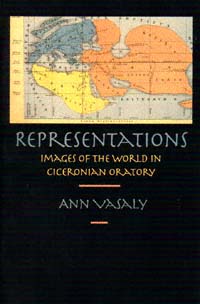 | Title: Representations: images of the world in Ciceronian oratory Author: Vasaly, Ann Published: University of California Press, 1993 Subjects: Classics | Literature | Politics | History | Literary Theory and Criticism | Classical Literature and Language Publisher's Description: Ann Vasaly introduces representation theory into the study of Ciceronian persuasion and contends that an understanding of milieu - social, political, topographical - is crucial to understanding Ciceronian oratory. As a genre uniquely dependent on an immediate interaction between author and audience, ancient oratory becomes performance art.Vasaly investigates the way Cicero represented the contemporary physical world - places, topography, and monuments, both those seen and those merely mentioned - to his listeners and demonstrates how he used these representations to persuade. Her exceptionally well-written study deftly recaptures the immediacy of Cicero's oratory and makes a trenchant contribution to an important new area of inquiry in Classical Studies. [brief] Similar Items |
| 2. | 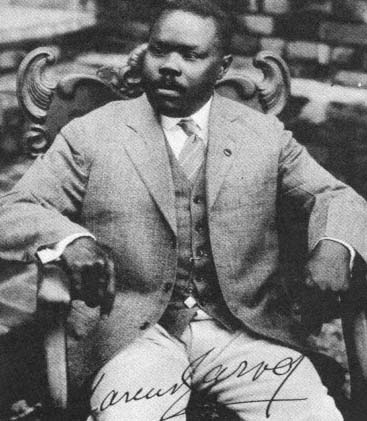 | Title: Marcus Garvey, life and lessons: a centennial companion to The Marcus Garvey and Universal Negro Improvement Association papers Author: Hill, Robert A 1943- Published: University of California Press, 1987 Subjects: History | United States History | African American Studies Publisher's Description: "I do not speak carelessly or recklessly but with a definite object of helping the people, especially those of my race, to know, to understand, and to realize themselves." - Marcus Garvey, Halifax, Nova Scotia, 1937A popular companion to the scholarly edition of The Marcus Garvey and Universal Negro Improvement Association Papers , this volume is a collection of autobiographical and philosophical works produced by Garvey in the period from his imprisonment in Atlanta to his death in London in 1940. [brief] Similar Items |
| 3. | 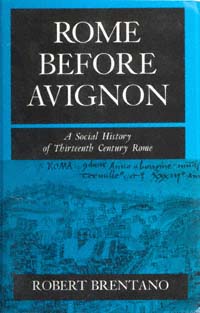 | Title: Rome before Avignon: a social history of thirteenth-century Rome Author: Brentano, Robert 1926- Published: University of California Press, 1991 Subjects: History | European History | Medieval History | Religion | Medieval Studies Publisher's Description: Robert Brentano evokes papal Rome in all its paradox and complicated brilliance. From a detailed re-creation of the physical "town" with its series of brick campanili and green and purple mosaic floors, to the intrigues of the great families, like the Orsini and Colonna, the reader is guided through complex and fascinating culture. Brentano's skill lies in his ability to combine the story of the vaulting ambition of the great families, only mildly tempered by their very real religious piety, with a vivid reconstruction of everyday life in postclassical Rome. [brief] Similar Items |
| 4. | 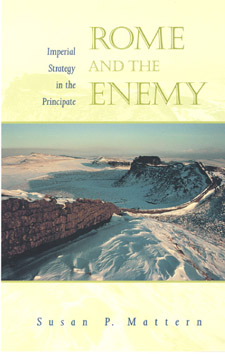 | Title: Rome and the enemy: imperial strategy in the principate Author: Mattern, Susan P 1966- Published: University of California Press, 1999 Subjects: Classics | Classical History | Classical Politics | Classical Literature and Language | Military History | Ancient History Publisher's Description: How did the Romans build and maintain one of the most powerful and stable empires in the history of the world? This illuminating book draws on the literature, especially the historiography, composed by the members of the elite who conducted Roman foreign affairs. From this evidence, Susan P. Mattern reevaluates the roots, motivations, and goals of Roman imperial foreign policy especially as that policy related to warfare. In a major reinterpretation of the sources, Rome and the Enemy shows that concepts of national honor, fierce competition for status, and revenge drove Roman foreign policy, and though different from the highly rationalizing strategies often attributed to the Romans, dictated patterns of response that remained consistent over centuries. Mattern reconstructs the world view of the Roman decision-makers, the emperors, and the elite from which they drew their advisers. She discusses Roman conceptions of geography, strategy, economics, and the influence of traditional Roman values on the conduct of military campaigns. She shows that these leaders were more strongly influenced by a traditional, stereotyped perception of the enemy and a drive to avenge insults to their national honor than by concepts of defensible borders. In fact, the desire to enforce an image of Roman power was a major policy goal behind many of their most brutal and aggressive campaigns. Rome and the Enemy provides a fascinating look into the Roman mind in addition to a compelling reexamination of Roman conceptions of warfare and national honor. The resulting picture creates a new understanding of Rome's long mastery of the Mediterranean world. [brief] Similar Items |
| 5. | 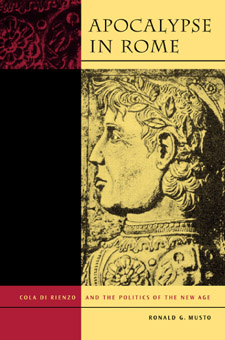 | Title: Apocalypse in Rome: Cola di Rienzo and the politics of the New Age Author: Musto, Ronald G Published: University of California Press, 2003 Subjects: History | European Studies | Medieval History | Medieval Studies | Autobiographies and Biographies | Classical Politics | Autobiographies and Biographies Publisher's Description: On May 20, 1347, Cola di Rienzo overthrew without violence the turbulent rule of Rome's barons and the absentee popes. A young visionary and the best political speaker of his time, Cola promised Rome a return to its former greatness. Ronald G. Musto's vivid biography of this charismatic leader - whose exploits have enlivened the work of poets, composers, and dramatists, as well as historians - peels away centuries of interpretation to reveal the realities of fourteenth-century Italy and to offer a comprehensive account of Cola's rise and fall. A man of modest origins, Cola gained a reputation as a talented professional with an unparalleled knowledge of Rome's classical remains. After earning the respect and friendship of Petrarch and the sponsorship of Pope Clement VI, Cola won the affections and loyalties of all classes of Romans. His buono stato established the reputation of Rome as the heralded New Jerusalem of the Apocalypse and quickly made the city a potent diplomatic and religious center that challenged the authority - and power - of both pope and emperor. At the height of Cola's rule, a conspiracy of pope and barons forced him to flee the city and live for years as a fugitive until he was betrayed and taken to Avignon to stand trial as a heretic. Musto relates the dramatic story of Cola's subsequent exoneration and return to central Italy as an agent of the new pope. But only weeks after he reestablished his government, he was slain by the Romans atop the Capitoline hill. In his exploration, Musto examines every known document pertaining to Cola's life, including papal, private, and diplomatic correspondence rarely used by earlier historians. With his intimate knowledge of historical Rome - its streets and ruins, its churches and palaces, from the busy Tiber riverfront to the lost splendor of the Capitoline - he brings a cinematic flair to this fascinating historical narrative. [brief] Similar Items |
| 6. | 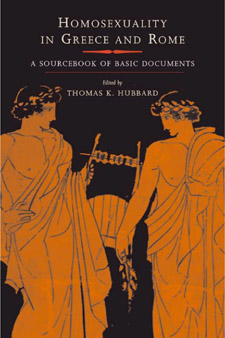 | Title: Homosexuality in Greece and Rome: a sourcebook of basic documents Author: Hubbard, Thomas K Published: University of California Press, 2003 Subjects: Gender Studies | Classics | GayLesbian and Bisexual Studies Publisher's Description: The most important primary texts on homosexuality in ancient Greece and Rome are translated into modern, explicit English and collected together for the first time in this comprehensive sourcebook. Covering an extensive period - from the earliest Greek texts in the late seventh century b.c.e. to Greco-Roman texts of the third and fourth centuries c.e. - the volume includes well-known writings by Plato, Sappho, Aeschines, Catullus, and Juvenal, as well as less well known but highly relevant and intriguing texts such as graffiti, comic fragments, magical papyri, medical treatises, and selected artistic evidence. These fluently translated texts, together with Thomas K. Hubbard's valuable introductions, clearly show that there was in fact no more consensus about homosexuality in ancient Greece and Rome than there is today. The material is organized by period and by genre, allowing readers to consider chronological developments in both Greece and Rome. Individual texts each are presented with a short introduction contextualizing them by date and, where necessary, discussing their place within a larger work. Chapter introductions discuss questions of genre and the ideological significance of the texts, while Hubbard's general introduction to the volume addresses issues such as sexual orientation in antiquity, moral judgments, class and ideology, and lesbianism. With its broad, unexpurgated, and thoroughly informed presentation, this unique anthology gives an essential perspective on homosexuality in classical antiquity. [brief] Similar Items |
| 7. | 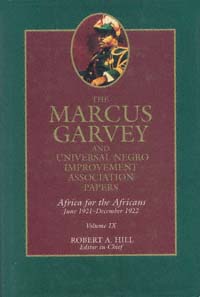 | Title: The Marcus Garvey and Universal Negro Improvement Association papers Author: Hill, Robert A 1943- Published: University of California Press, 1995 Subjects: History | African Studies | African History | Politics Publisher's Description: "Africa for the Africans" was the name given in Africa to the extraordinary black social protest movement led by Jamaican Marcus Mosiah Garvey (1887-1940). Volumes I-VII of the Marcus Garvey and Universal Negro Improvement Association Papers chronicled the Garvey movement that flourished in the United States during the 1920s. Now, the long-awaited African volumes of this edition (Volumes VIII and IX and a forthcoming Volume X) demonstrate clearly the central role Africans played in the development of the Garvey phenomenon.The African volumes provide the first authoritative account of how Africans transformed Garveyism from an external stimulus into an African social movement. They also represent the most extensive collection of documents ever gathered on the early African nationalism of the inter-war period. Here is a detailed chronicle of the spread of Garvey's call for African redemption throughout Africa and the repressive colonial responses it engendered. Volume VIII begins in 1917 with the little-known story of the Pan-African commercial schemes that preceded Garveyism and charts the early African reactions to the UNIA. Volume IX continues the story, documenting the establishment of UNIA chapters throughout Africa and presenting new evidence linking Garveyism and nascent Namibian nationalism. [brief] Similar Items |
| 8. | 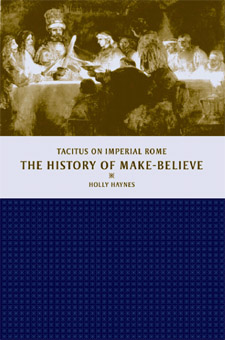 | Title: The history of make-believe: Tacitus on imperial Rome Author: Haynes, Holly Published: University of California Press, 2003 Subjects: Classics | Classical History | Classical Literature and Language | Political Theory | Ancient History Publisher's Description: A theoretically sophisticated and illuminating reading of Tacitus, especially the Histories , this work points to a new understanding of the logic of Roman rule during the early Empire. Tacitus, in Holly Haynes' analysis, does not write about the reality of imperial politics and culture but about the imaginary picture that imperial society makes of these concrete conditions of existence - the "making up and believing" that figure in both the subjective shaping of reality and the objective interpretation of it. Haynes traces Tacitus's development of this fingere/credere dynamic both backward and forward from the crucial year A.D. 69. Using recent theories of ideology, especially within the Marxist and psychoanalytic traditions, she exposes the psychic logic lurking behind the actions and inaction of the protagonists of the Histories . Her work demonstrates how Tacitus offers penetrating insights into the conditions of historical knowledge and into the psychic logic of power and its vicissitudes, from Augustus through the Flavians. By clarifying an explicit acknowledgment of the difficult relationship between res and verba, in the Histories, Haynes shows how Tacitus calls into question the possibility of objective knowing - how he may in fact be the first to allow readers to separate the objectively knowable from the objectively unknowable. Thus, Tacitus appears here as going further toward identifying the object of historical inquiry - and hence toward an "objective" rendering of history - than most historians before or since. [brief] Similar Items |
| 9. |  | Title: The wood duck and the mandarin: the northern wood ducks Author: Shurtleff, Lawton L Published: University of California Press, 1996 Subjects: Environmental Studies | Zoology | Environmental Studies | Biology Publisher's Description: This is a story of conservation told through the natural histories of two of the world's most fascinating birds, the Wood Duck of North America and the Mandarin of Asia. The only two species in their genus ( Aix ), these Northern Wood Ducks are native to different continents but have long been kept together in captivity. Now, for the first time in history, they are also flying side by side in the wild in a small area of northern California. This rare circumstance has given Lawton L. Shurtleff and Christopher Savage the opportunity to observe the Northern Wood Ducks' close relationship and is the starting point of this informative and beautifully rendered book.The opening chapters tell how the Wood Duck and the Mandarin came to inhabit the Pacific Flyway and explain their extraordinary similarities. Subsequent chapters discuss the distinctive histories of the two species and describe the birds throughout the seasons in their native flyways. The Mandarins' place in Asian art and literature is the subject of Chapter Five. The final chapter illuminates the successful work done to protect the North American Wood Duck, which has made a remarkable recovery from near extinction, and the beginning efforts to protect the Mandarin, whose existence in East Asia is seriously threatened.Stunning full-color photographs by renowned wildlife photographers, along with photographs by the authors, capture the exquisite beauty of these much revered birds. Detailed maps show the Wood Ducks' territory in North America and the Mandarins' territory in East Asia and Great Britain. Three appendices - plans for building nestboxes, instructions for banding birds, and lists of books and conservation organizations - and a thorough index are valuable resources in a book that will delight bird-lovers and general readers alike. [brief] Similar Items |
| 10. | 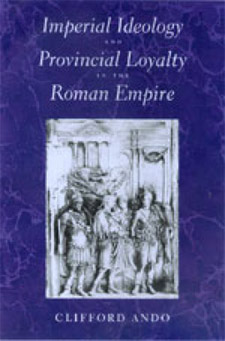 | Title: Imperial ideology and provincial loyalty in the Roman Empire Author: Ando, Clifford 1969- Published: University of California Press, 2000 Subjects: Classics | Classical History | Ancient History | Social Theory Publisher's Description: The Roman empire remains unique. Although Rome claimed to rule the world, it did not. Rather, its uniqueness stems from the culture it created and the loyalty it inspired across an area that stretched from the Tyne to the Euphrates. Moreover, the empire created this culture with a bureaucracy smaller than that of a typical late-twentieth-century research university. In approaching this problem, Clifford Ando does not ask the ever-fashionable question, Why did the Roman empire fall? Rather, he asks, Why did the empire last so long? Imperial Ideology and Provincial Loyalty in the Roman Empire argues that the longevity of the empire rested not on Roman military power but on a gradually realized consensus that Roman rule was justified. This consensus was itself the product of a complex conversation between the central government and its far-flung peripheries. Ando investigates the mechanisms that sustained this conversation, explores its contribution to the legitimation of Roman power, and reveals as its product the provincial absorption of the forms and content of Roman political and legal discourse. Throughout, his sophisticated and subtle reading is informed by current thinking on social formation by theorists such as Max Weber, Jürgen Habermas, and Pierre Bourdieu. [brief] Similar Items |
| 11. | 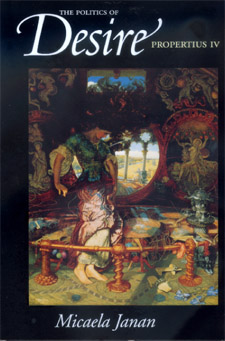 | Title: The politics of desire: Propertius IV Author: Janan, Micaela Wakil Published: University of California Press, 2000 Subjects: Classics | Classical Literature and Language | Poetry Publisher's Description: Propertius (ca. 54 b.c.--ca. 2 b.c.) was a Roman poet who composed four compelling books of elegies in the chaotic years surrounding Rome's transition from republic to empire. The first three of these books revolve mostly around a tormented love affair with a woman called Cynthia. The fourth book of poetry rests on more diverse subject matter and is notoriously the most opaque and elusive. In The Politics of Desire, Micaela Janan radically reassesses Propertius' last elegies, using contemporary psychoanalytic theory to illuminate these challenging texts. Janan finds that the upheaval of Rome's transformation to empire corresponds to the intellectually unsettled conditions of our own time, so that contemporary methodologies offer an uncannily suitable approach for understanding Propertius. In particular, she uses the work of Jacques Lacan, since it provides the best conceptual tools for examining the relation between political crisis and the struggles of the self, a theme that resonates in these difficult elegies. This book expands our understanding of an important Roman poet, and its innovative and sophisticated methodological approach makes a substantial contribution to feminist and psychoanalytic criticism. In addition, Janan addresses elegy's relationship to larger cultural questions, and broadens our understanding of the social crisis affecting Rome during the early empire. [brief] Similar Items |
| 12. | 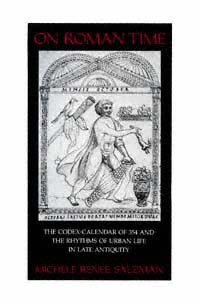 | Title: On Roman time: the codex-calendar of 354 and the rhythms of urban life in late antiquity Author: Salzman, Michele Renee Published: University of California Press, 1991 Subjects: Classics | Religion | Classical History Publisher's Description: Because they list all the public holidays and pagan festivals of the age, calendars provide unique insights into the culture and everyday life of ancient Rome. The Codex-Calendar of 354 miraculously survived the Fall of Rome. Although it was subsequently lost, the copies made in the Renaissance remain invaluable documents of Roman society and religion in the years between Constantine's conversion and the fall of the Western Empire.In this richly illustrated book, Michele Renee Salzman establishes that the traditions of Roman art and literature were still very much alive in the mid-fourth century. Going beyond this analysis of precedents and genre, Salzman also studies the Calendar of 354 as a reflection of the world that produced and used it. Her work reveals the continuing importance of pagan festivals and cults in the Christian era and highlights the rise of a respectable aristocratic Christianity that combined pagan and Christian practices. Salzman stresses the key role of the Christian emperors and imperial institutions in supporting pagan rituals. Such policies of accomodation and assimilation resulted in a gradual and relatively peaceful transformation of Rome from a pagan to a Christian capital. [brief] Similar Items |
| 13. | 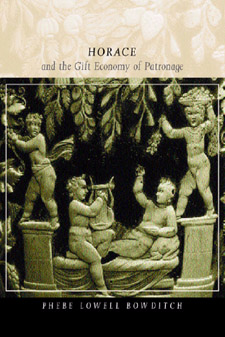 | Title: Horace and the gift economy of patronage Author: Bowditch, Phebe Lowell 1961- Published: University of California Press, 2001 Subjects: Classics | Classical Literature and Language | Poetry | Cultural Anthropology Publisher's Description: This innovative study explores selected odes and epistles by the late-first-century poet Horace in light of modern anthropological and literary theory. Phebe Lowell Bowditch looks in particular at how the relationship between Horace and his patron Maecenas is reflected in these poems' themes and rhetorical figures. Using anthropological studies on gift exchange, she uncovers an implicit economic dynamic in these poems and skillfully challenges standard views on literary patronage in this period. Horace and the Gift Economy of Patronage provides a striking new understanding of Horace's poems and the Roman system of patronage, and also demonstrates the relevance of New Historicist and Marxist critical paradigms for Roman studies. In addition to incorporating anthropological and sociological perspectives, Bowditch's theoretical approach makes use of concepts drawn from linguistics, deconstruction, and the work of Michel Foucault. She weaves together these ideas in an original approach to Horace's use of golden age imagery, his language concerning public gifts or munera, his metaphors of sacrifice, and the rhetoric of class and status found in these poems. Horace and the Gift Economy of Patronage represents an original approach to central issues and questions in the study of Latin literature, and sheds new light on our understanding of Roman society in general. [brief] Similar Items |
| 14. | 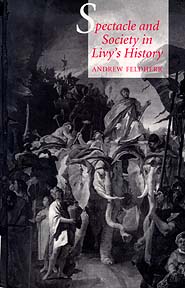 | Title: Spectacle and society in Livy's history Author: Feldherr, Andrew 1963- Published: University of California Press, 1998 Subjects: Classics | Classical Literature and Language | Classical History | Comparative Literature | Literature Publisher's Description: Public spectacle - from the morning rituals of the Roman noble to triumphs and the shows of the Arena - formed a crucial component of the language of power in ancient Rome. The historian Livy (c. 60 B.C.E.-17 C.E.), who provides our fullest description of Rome's early history, presents his account of the growth of the Roman state itself as something to be seen - a visual monument and public spectacle. Through analysis of several episodes in Livy's History , Andrew Feldherr demonstrates the ways in which Livy uses specific visual imagery to make the reader not only an observer of certain key events in Roman history but also a participant in those events. This innovative study incorporates recent literary and cultural theory with detailed historical analysis to put an ancient text into dialogue with contemporary discussions of visual culture.In Spectacle and Society in Livy's History , Feldherr shows how Livy uses the literary representation of spectacles from the Roman past to construct a new sense of civic identity among his readers. He offers a new way of understanding how Livy's technique addressed the political and cultural needs of Roman citizens in Livy's day. In addition to renewing our understanding of Livy through modern scholarship, Feldherr provides a new assessment of the historian's aims and methods by asking what it means for the historian to make readers spectators of history. [brief] Similar Items |
| 15. | 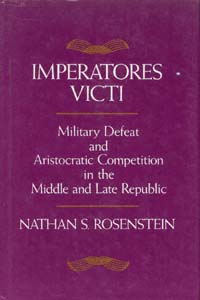 | Title: Imperatores victi: military defeat and aristocratic competition in the middle and late republic Author: Rosenstein, Nathan Stewart Published: University of California Press, 1990 Subjects: Classics | Classical History | Military History | Ancient History Publisher's Description: Given the intense competition among aristocrats seeking public office in the middle and late Roman Republic, one would expect that their persistent struggles for honor, glory, and power could have seriously undermined the state or damaged the cohesiveness of the ruling class. Rome in fact depended on aristocratic competition, since no professional bureaucracy directed public affairs and no salary was attached to any public office. But as Rosenstein adeptly shows, competition appears to have been surprisingly limited, in ways that curtailed the possible destructive effects of all-out contests between individuals. Imperatores Victi examines one particularly striking case of such checks on competition. Military success at all times represented an abundant source of prestige and political strength at Rome. Generals who led armies to victory enjoyed a better-than-average chance of securing higher office upon their return from the field. Yet this study demonstrates that defeated generals were not barred from public office and in fact went on to win the Republic's most highly coveted and hotly contested offices in numbers virtually identical with those of their undefeated peers.Rosenstein explores how this unexpected limit to competition functions, reviewing beliefs about the religious origins of defeat, assumptions about common soldiers' duties in battle, and definitions of honorable behavior of an aristocrat during a crisis. These perspectives were instrumental in shifting the onus of failure away from a general's person and in offering positive strategies a general might use to win glory and respect even in defeat and to silence potential critics among a failed general's peers. Such limits to competition had an impact on the larger problems of stability and coherence in the Republic and its political elite; these larger problems are discussed in the concluding chapter. [brief] Similar Items |
| 16. | 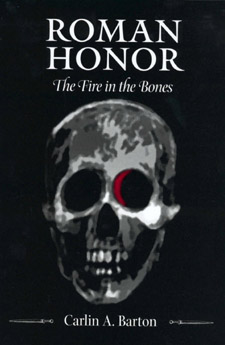 | Title: Roman honor: the fire in the bones Author: Barton, Carlin A 1948- Published: University of California Press, 2001 Subjects: Classics | Ancient History | Classical History | Classical Politics | Classical Religions | Comparative Literature Publisher's Description: This book is an attempt to coax Roman history closer to the bone, to the breath and matter of the living being. Drawing from a remarkable array of ancient and modern sources, Carlin Barton offers the most complex understanding to date of the emotional and spiritual life of the ancient Romans. Her provocative and original inquiry focuses on the sentiments of honor that shaped the Romans' sense of themselves and their society. Speaking directly to the concerns and curiosities of the contemporary reader, Barton brings Roman society to life, elucidating the complex relation between the inner life of its citizens and its social fabric. Though thoroughly grounded in the ancient writings - especially the work of Seneca, Cicero, and Livy - this book also draws from contemporary theories of the self and social theory to deepen our understanding of ancient Rome. Barton explores the relation between inner desires and social behavior through an evocative analysis of the operation, in Roman society, of contests and ordeals, acts of supplication and confession, and the sense of shame. As she fleshes out Roman physical and psychological life, she particularly sheds new light on the consequential transition from republic to empire as a watershed of Roman social relations. Barton's ability to build productively on both old and new scholarship on Roman history, society, and culture and her imaginative use of a wide range of work in such fields as anthropology, sociology, psychology, modern history, and popular culture will make this book appealing for readers interested in many subjects. This beautifully written work not only generates insight into Roman history, but also uses that insight to bring us to a new understanding of ourselves, our modern codes of honor, and why it is that we think and act the way we do. [brief] Similar Items |
| 17. |  | Title: Gasparo Contarini: Venice, Rome, and reform Author: Gleason, Elisabeth G Published: University of California Press, 1993 Subjects: History | Religion | Renaissance History | European History | Christianity Publisher's Description: Gasparo Contarini (1483-1542) was a major protagonist in the Counter-Reformation of the sixteenth century. A worldly Venetian patrician, he later became an ascetic advocate of Church reform and, as a Catholic cardinal, was sent to the important Colloquy of Regensburg. He failed in his mission to bring about an agreement between Lutherans and Catholics; nevertheless, his life and thought, as well as his friendships with the most vocal proponents of concord, peace, and toleration, make him an impressive and significant historical figure.In the first biography of Contarini since 1885, Elisabeth Gleason greatly broadens our understanding of the man and his times. As a result, scholars and students will come to see Cardinal Gasparo Contarini as a reminder of alternative concepts of authority and liberty in both church and state. [brief] Similar Items |
| 18. | 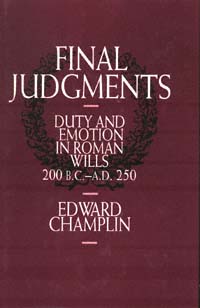 | Title: Final judgments: duty and emotion in Roman wills, 200 B.C.-A.D. 250 Author: Champlin, Edward 1948- Published: University of California Press, 1991 Subjects: Classics | Ancient History Publisher's Description: Freed from the familial and social obligations incumbent on the living, the Roman testator could craft his will to be a literal "last judgment" on family, friends, and society. The Romans were fascinated by the contents of wills, believing the will to be a mirror of the testator's true character and opinions. The wills offer us a unique view of the individual Roman testator's world. Just as classicists, ancient historians, and legal historians will find a mine of information here, the general reader will be fascinated by the book's lively recounting of last testaments.Who were the testators and what were their motives? Why do family, kin, servants, friends, and community all figure in the will, and how are they treated? What sort of afterlife did the Romans anticipate? By examining wills, the book sets several issues in a new light, offering new interpretations of, or new insights into, subjects as diverse as captatio (inheritance-seeking), the structure of the Roman family, the manumission of slaves, public philanthropy, the afterlife and the relation of subject to emperor.Champlin's principal argument is that a strongly felt "duty of testacy" informed and guided most Romans, a duty to reward or punish all who were important to them, a duty which led them to write their wills early in life and to revise them frequently. [brief] Similar Items |
| 19. |  | Title: Historied thought, constructed world: a conceptual primer for the turn of the millennium Author: Margolis, Joseph 1924- Published: University of California Press, 1995 Subjects: Philosophy | Social and Political Thought | Intellectual History Publisher's Description: Historied Thought, Constructed World offers a fresh vision: one that engages the reigning philosophies of the West, endorses the radical possibilities of historicity and flux, and reconciles the best themes of Anglo-American and continental European philosophy. Margolis sketches a program for the philosophy of the future, addressing topics such as the historical character of thinking, the intelligible world as artifact, the inseparability of theory and practice, and the reliability of a world without assured changeless structures.Through the use of numbered theorems that construct an interlocking argument, Margolis carefully articulates his distinctive ideas in the context of work by Quine, Davidson, Putnam, Rorty, Derrida, Habermas, and Foucault. The discussion includes all the central topics of the philosophical tradition: from science to morality, from language to world, from persons to objects, from nature to culture, from causality to purpose, from change to history. What emerges is an argument against essentialism, one that champions the historicity of thought and cultural constructionism. [brief] Similar Items |
| 20. |  | Title: Darwin in Russian thought Author: Vucinich, Alexander 1914- Published: University of California Press, 1989 Subjects: Science | History and Philosophy of Science Publisher's Description: Darwin in Russian Thought represents the first comprehensive and systematic study of Charles Darwin's influence on Russian thought from the early 1860s to the October Revolution. While concentrating on the role of Darwin's theory in the development of Russian science and philosophy, Vucinich also explores the dominant ideological and sociological interpretations of evolutionary thought, providing a deft analysis of the views held by the leaders of Russian nihilism, populism, anarchism, and marxism.Darwin's thinking profoundly influenced intellectual discourse in Russia: it effected the emergence of "theoretical theology," a modern effort to provide theological responses to the revolutionary changes in the natural sciences, contributed to the evolution of a modern scientific community, and spurred the rapidly growing concern with the epistemological and ethical foundations of science in general. Scholarly battles were waged among the critics of Darwin - Karl von Baer, Nikolai Iakovlevich Danilevskii and Sergei Ivanovich Korzhinskii, and others - and the defenders of the faith.Vucinich is able to delineate the distinctive national characteristics of Russian Darwinism: the strong influence of Lamarckian thought, the delayed recognition of the contributions of genetics, the near-universal rejection of Social Darwinism, the early anticipation of the triumph of "evolutionary synthesis," and the heavy concentration on the social and moral aspects of evolutionary thought. Vividly argued and rich in detail, Darwin in Russian Thought provides a unique glimpse into the Russian psyche. [brief] Similar Items |